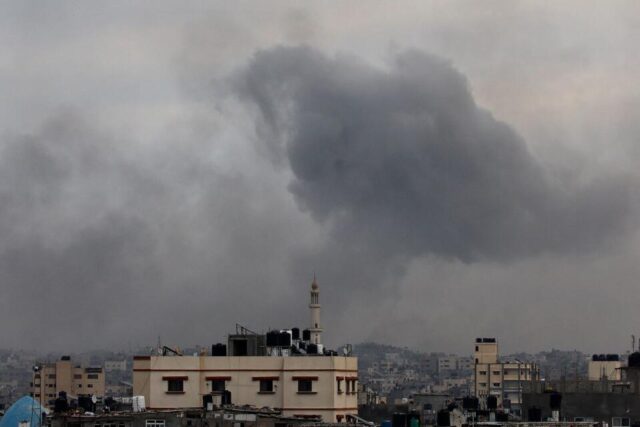Relatives of hostages again rallied in Tel Aviv on Saturday to call for an urgent deal to bring them home after the army admitted to mistakenly killing three captives in Gaza.
ISRAEL kept up deadly strikes on the besieged Gaza Strip on Sunday despite growing international calls for a ceasefire and pleas from desperate relatives to bring home the remaining hostages.
Fighting raged on in the bloodiest-ever Gaza war, now in its third month, that started with the Hamas attacks of October 7 and has devastated much of the Palestinian territory, sparking global concern.
The health ministry in the Hamasrun Gaza Strip said that “24 Palestinians were killed this morning in Jabalia camp by an Israeli bombardment. Many are still missing under the rubble”.
It also said at least 12 people died in strikes on the central city of Deir al-Balah, while witnesses reported bombardment of Bani Suhaila east of Khan Yunis, Gaza’s second city.
Israeli Prime Minister Benjamin Netanyahu again vowed that “we will fight until the end. We will achieve all of our aims – eliminating Hamas, freeing all our hostages and ensuring that Gaza will not again become a centre for terrorism.”
French Foreign Minister Catherine Colonna, the latest foreign envoy visiting Israel, called for an “immediate and durable” truce leading to a lasting ceasefire, stressing that “too many civilians are being killed”.
Her British and German counterparts, David Cameron and Annalena Baerbock, also bemoaned the high civilian toll but voiced a different stance on the conflict, in a joint Sunday Times article.
The pair wrote that they “support a ceasefire, but only if it is sustainable … We do not believe that calling right now for a general and immediate ceasefire, hoping it somehow becomes permanent, is the way forward.
“It ignores why Israel is forced to defend itself: Hamas barbarically attacked Israel and still fires rockets to kill Israeli citizens every day. Hamas must lay down its arms.”
The Gaza war started when Hamas militants burst through Gaza’s high-security border fence and launched the worst-ever attack on Israel on October 7. They killed about 1 140 people, mostly civilians, and abducted 250, according to updated Israeli figures, with about 129 still believed in captivity after scores were released and others killed.
According to Hamas, Israel’s retaliatory offensive, including over two months of sustained aerial bombardment and a ground invasion, has killed 18 800 people, mostly women and children.
Israel’s bombardment of Gaza has left much of the territory in ruins, with the UN estimating 1.9 million Gazans displaced by the war and warning of a “breakdown of civil order”.
The UN’s World Health Organization (WHO) also sounded the alarm over Gaza’s humanitarian disaster after visiting the largest hospital, Gaza City’s Al-Shifa, weeks after it was raided by Israeli forces in pursuit of Hamas militants. The visiting WHO team described the emergency department as a “bloodbath” with hundreds of injured patients inside, and new patients arriving every minute.
“Patients with trauma injuries were being sutured on the floor,” it said, while “tens of thousands of displaced people are using the hospital building and grounds for shelter” amid “a severe shortage” of water and food.
The Israeli government has come under growing pressure, including from its top ally the US, but also from families of hostages, to either slow, suspend or end the military campaign.
Relatives of hostages again rallied in Tel Aviv on Saturday to call for an urgent deal to bring them home after the army admitted to mistakenly killing three captives in Gaza.
Ruby Chen, father of 19-year-old soldier Itai, who is among the remaining 129 captives, said: “We feel like we’re in a Russian roulette game …who will be next in line to be told the death of their loved one.”
AFP








